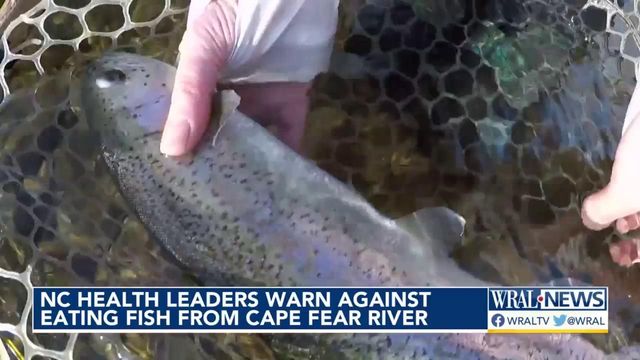State issues advisory on fish consumption from middle and lower Cape Fear River
The North Carolina Department of Health and Human Services has issued an advisory on the consumption of certain fish caught in the middle and lower Cape Fear River.
Posted — UpdatedThe state is recommending limits on consumption of certain freshwater fish from the middle and lower Cape Fear River based on concerns about exposure to perfluorooctane sulfonic acid (PFOS) found in fish sampled from the area.
The North Carolina Department of Health and Human Services (NCDHHS) issued an advisory on Thursday. Here’s what people need to know:
- American Shad, Blue Catfish, Channel Catfish: No more than one meal per year combined across all agencies.
- Bluegill, flathead catfish, largemouth bass, striped bass, redear: Do not eat.
- American Shad, Blue Catfish, Channel Catfish: No more than seven meals per year combined across all agencies.
- Bluegill, flathead catfish, largemouth bass, striped bass, redear: No more than one meal per year combined across all agencies.
“What this basically means is that, these advisories are an indication that these chemicals are present in the fish tissue," said NCDHHS epidemiologist Zack Moore. "And, we know that these chemicals can have impacts on people's health.
"So these advisories are intended to help people understand those risks and to weigh those risks against what we know are some health benefits and positive health effects of catching and eating fish.”
PFOS is part of a group of chemicals called per- and polyfluoroalkyl substances (PFAS), which are often called “forever chemicals” because they do not break down in the environment. The recommendations are based on newly available data and new information from the U.S. Environmental Protection Agency (USEPA). Many states provide recommendations to limit or avoid eating certain fish due to PFAS.
Virginia Guidry is in charge of issuing fish advisories for the NCDHHS.
“We really want them to have this information so that they can balance the health benefits of eating fish with these potential risks, which we are estimating here today," Guidry said. "And this may be a different calculation for different families, but we want them to have this information so they can make that decision for their families.”
PFAS are an emerging public health concern with multiple potential sources of exposure, including contaminated drinking water and food, indoor dust, some consumer products and workplaces.
"Studies have documented the many benefits of eating fish," said Dr. Elizabeth Cuervo Tilson, State Health Director and NCDHHS Chief Medical Officer. "We want residents to have these recommendations so they can make informed decisions about fish consumption, particularly if they regularly catch and eat fish from this part of the Cape Fear River."
Exposure to PFAS from fish may be higher among communities that catch and eat fish frequently.
“The troubling news about the contaminated fish in the Cape Fear River is another warning that forever chemicals threaten our health and way of life in North Carolina," said NC Conservation Network senior campaign organizer Stephanie Schweickert. "And, communities across the state will continue to be impacted by these chemicals in new and dangerous ways until we really take action to end PFAS chemicals and pollution statewide.”
Studies have linked PFAS to several health effects, particularly after long-term exposure. These include negative effects on growth, learning and behavior in children; reduced chances of getting pregnant; impaired thyroid function; increased cholesterol levels; decreased immune system response; and increased risk of certain types of cancer, including testicular and kidney cancer.
"Communities in the middle and lower Cape Fear Region have been requesting information about PFAS in fish since GenX was found in the river," said Dr. Zack Moore, NCDHHS State Epidemiologist. "There are no easy answers, but we hope this information will help residents make the best decisions for themselves and their families."
Related Topics
• Credits
Copyright 2024 by Capitol Broadcasting Company. All rights reserved. This material may not be published, broadcast, rewritten or redistributed.





